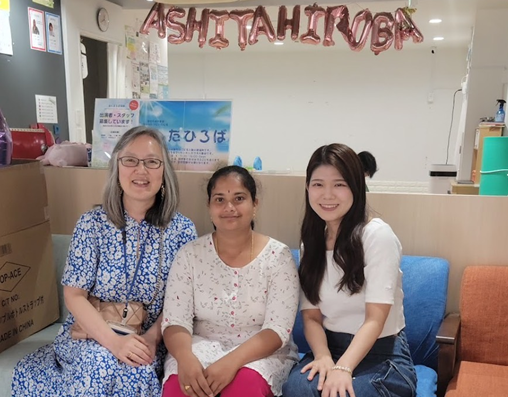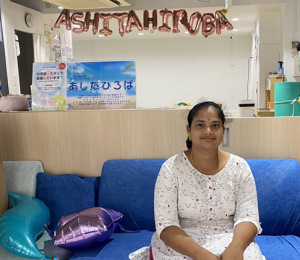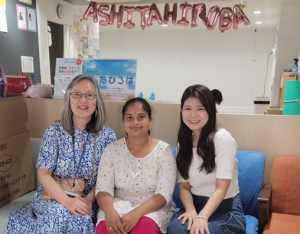
【記事】金沢シーサイドタウンでの多文化共生の試みを振り返って
2023/11/30(木) 情報コンシェルジュ
金沢シーサイドタウンでの多文化共生の試みを振り返って
~グローバルプレーデートの紹介
Global Play Date(GPD)は2022年に横浜市立大学国際教養学部社会福祉論ゼミ(教授 陳礼美)の2年生ゼミが立ち上げた未就学児と保護者に向けた活動である。本活動の目的は、増加傾向にある外国由来の方々を地域の一員として包摂することである。特に、コロナ禍で孤立しがちだった外国由来の方々に、子ども向けイベントへのお誘いや積極的なアウトリーチを地域住民と連携を取りながら行った。これらの活動から少しでも子育て時期に必要な支援に繋げたい思いで行ってきた。
GPDは世界の歌や踊りを取り上げたリトミック、伝統的な日本の手遊びや折り紙の紹介、「Global Kitchen」と名付けた料理教室を外国由来の保護者が主体的に行う企画等、誰もが楽しめて学べる色々な「仕掛け」を試みた。おかげさまで年に数回行われていた本活動もまちの要請で月に一回開催されるまでとなった。同じ子育て世代の日本人親子たちが支援者に回ったり、日本人と外国人の間に生まれた子どもを抱える保護者たちが文化の狭間にいることを話し合う集いも自然にできたり、想像以上の波及効果があった。GPDは2023年8月に陳の退職により終了したが、地域の方々によって外国由来の家族への支援は今も継続している。
今回の記事では、GPDに参加されていた外国由来のお母さまの声とGPDの活動を立ち上げた大学生の声を紹介したい。
陳 礼美(ジョージメイソン大学公衆衛生学部ソーシャルワ―ク学科 助教授)
Thoughts on our endeavors to promote diversity in Kanazawa Seaside Town
-Introducing the project Global Play Date –
Global Play Date (GPD) was founded in 2022 by students from the social work research seminar at Yokohama City University (Dr. Li-Mei Chen) as an event for parents and pre-school children. The goals of the project was to include the foreign residents in the area as members of the community. In particular, we invited foreign families to children’s events and made proactive outreach efforts with local residents to families who were more likely to be isolated during the pandemic. Through these activities, we hoped to link families with needed resources for child’s development.
GPD hosted different types of event to engage with foreign families: rhythmic classes with songs and dances from different countries, introducing Japanese traditional hand games and origami, and a cooking class named “Global Kitchen”
which conducted by the foreign mother herself. Our efforts paid off and our events which were held a few times per year became a monthly event by the request of the community. There were Japanese families who also became supporters assisting other foreign families and a gathering of families with mixed racial and ethnic backgrounds naturally formed as unexpected outcomes of this project. The GPD events ended in August 2023 due to my leave from Yokohama City University, but the support for foreign families still continue to this day by the works of the local residents.
In this article, we will share the experiences from a frequent participant of GPD and from a founding student member of GPD.
Li-Mei Chen, PhD, MSW, Assistant Professor, George Mason University School of Public Health Department of Social Work

金沢シーサイドタウンに住むニーラン・サンディア(Neelan Sandhya) さん
Ms. Sandhya Neelan who lives in Kanazawa Seaside Town (at the time of the interview)

5年前に仕事で来日していた夫を追って、2歳の息子レヤンシュ君と二人でコロナ禍の中、来日した。今年8月に夫の仕事で再び引っ越しするサンディアさんとシーサイドタウンでの子育てについて振り返る。
サンディアさんにとって子育てでとても助かったことは二つある。一つは、民生委員や地区社協の女性たちの存在である。息子さんと公園で遊んでいたときに、民生委員の方に出会ったことで地域の活動に参加したり、友だちができたりした。はじめは信頼していいか、とても不安だったらしいが、毎週のように会いに来てくれる民生委員さんと信頼関係は深まり、いつの間にか地域で最も頼りにする存在となった。民生委員さんを通して知った横浜市立大学のゼミ(教授 陳礼美)が行っているGlobal Play Date(GPD) という未就学児向けの国際交流イベントにも定期的に参加した。サンディアさんから感じた一番の収穫は、「息子の行動が変わった」と教えてくれた。一人っ子の息子が友だちとおもちゃを共有することができるようになったことがとても嬉しかったそうだ。
二つは、生活環境である。自宅側に息子が通う幼稚園もあり、子ども向けのイベントも多い。横浜市立大学のゼミ(教授 三輪律江)の外遊び活動「ぱあくる」等に参加することで家にこもりがちだった最初の二、三ヶ月から状況は一辺したという。
生活の不安要素について聞いたら、一つは、人生初の地震がとても怖かったそうだ。その後、GPDで防災袋の準備について知り、家族三人分の備えは玄関に置いてある。次に、言葉の壁。金沢文庫の日本語教室で月に2回学習された。ゼロからの出発点だったが、今は日本語混じりでインタビューに答えてくれた。「日本での生活は不安や寂しさがゼロではないが、積極的に外に出て色々な人と関わってほしい」と他の子育て家族に向けてメッセージもくださった。幼稚園の先生方と涙のお別れをしたそうだ。慣れない入園準備も今はいい思い出であり、移転先でも問題なく準備できる、と自信いっぱいだ。
文責: 川口 理夏(横浜市立大学国際教養学部4年)
“My son’s behavior changed.”
Sandhya came to Japan with her two year old son Reyansh during the pandemic to be with her husband who was already working in Japan for the past five years. My advisor and I sat with Sandya and reflected on her experience raising her son in Kanazawa Seaside Town before the family moved this August due to her husband’s new job.
Sandya told me that there were two things which were helpful for her as a mother. Firstly, she found that getting to know the local minsei-iin (or, community welfare commissioner) and women from the chiku shakyo (or, district social welfare council) was helpful. Sandhya started to learn about the local events and made new friends ever since the minsei-iin approached them when they were playing in the local park. Initially, she was worried about trusting the minsei-iin, but through the weekly visits paid by the minsei-iin, they fostered their trust and friendship. Through the minsei-iin, she learned about the Global Play Date (GPD) events organized by the students from Yokohama City University, and she soon became a frequent participant of the GPD. Sandhya tells us that her biggest gain at GPD was the change in her son’s behavior. She was so happy to see her son who was growing up as the only child learned how to share toys with other children.
Secondly, she really liked the living environment here. Her son’s kindergarten is right near their home and there are many local events for children. She told me that attending the outdoor children’s events such as “Parkle” hosted by the Yokohama City University students (Dr. Norie Miwa’s research seminar) completely transformed her life which was isolated and lonely for the first two to three months in Japan.
I asked if she had any worries about living in Japan, and she responded that her first experience with earthquakes scared her. After experiencing one, she learned at GPD about how Japanese households keep emergency bags at home. Now she has three bags for her family at her door. The other worry was the language barrier. Today, Sandhya studies Japanese twice a month at a language class held at Kanazawa Bunko. She spoke no word of Japanese in the beginning, but now she is able to carry out this interview in some Japanese. She left us with a message to other expats who are raising children in Japan: “Living in Japan is not free from worries and loneliness, but I wish you will take the chance to go out and get to know people.” Recently, she said her goodbyes with her son’s kindergarten teachers in tears. Preparing her son for a Japanese kindergarten was a challenge, but in hindsight, it is all good memories for her. Sandhya is very confident that she can do the same effortlessly in her next destination.
Written by Rika Kawaguchi (Yokohama City University School of International Liberal Arts, 4th year student)


2年前に大学のゼミプロジェクトで、Global Play Date を立ち上げた。横浜市の並木という地域で外国籍の方々が多く住むということで、その地域でのコミュニティの場や生活の相談場として、活動を始めた。
ゼロからのスタートということで、地域に活動を定着させることは大変だった。しかし、毎月継続的に開催することで、常連さんが出来たり、地域の民生委員の方とつながることで連携を取れたりできるようになっていった。子ども同士の交流の場としてはもちろん、お母さん同士の交流の場にもなっており、国籍や世代などを超えたコミュニティの場となったと自負している。
継続的に参加してくれていた、インド国籍のNeelan. Sandhya さん(サンディアさん)に実際にインタビューを行ったところ、Global Play Date を通して、子どもが遊びを通して社会性を身に着けることが出来た、と言ってくれた。サンディアさん自身も、子どもの入園の手続きや、日本での防災の知識、病院のことなど、生活するうえでの相談ができる場になっていたようで、私たちの活動が大きな意味を持っていることを感じ、うれしく思う。外に出て地域の色々な人と交流し、日本での生活が楽しいと感じるきっかけに少しでもなれていたら、こんなにもうれしいことはない。
私自身も、この活動を通して、多くのことを学んだ。まずは、共感の大切さだ。お母さん同士が子育ての悩みや、他国に住むことの苦労などを共有して共感しあっている様子を見て、共感を得られることで、安心したり、心の支えになったりするのだ、ということに改めて気づくことが出来た。また、積極的に色々な人と関わることは自分自身の視野を広げることになり、その一つ一つの出会いはとても価値のあるものでることも学んだ。この活動を通して私自身大きく成長することが出来、出会った方々全員に感謝をしたい。
文責: 川口 理夏(横浜市立大学国際教養学部4年)
“I learned the power of encounters”
Two years ago, I created Global Play Date as my university research seminar project with my fellow seminar students. We learned that the Namiki district located in Yokohama City saw an increase in foreign residents, so we decided to create a community and space for foreign families in hopes of supporting their lives in Japan.
We started this project from zero, so it was initially very difficult to get accepted by the community. However, as we continued our monthly events, we gained frequent participants and collaborated with the local welfare commissioners. The space we created became a place for kids to play, but also it became a place for mothers to socialize with each other. I am confident that it turned out to be an inclusive community for anyone regardless of origin or generation.
I learned from the interview with Sandhya Neelan, a woman from India who was a frequent participant of our events, how her son nurtured his social identity through kids play. Sandhya herself learned through these events about how to prepare for kindergarten admissions, disaster prevention, and hospitals, which were all necessary for making a livelihood in Japan. It makes me proud that our events made an impact on the people we wanted to reach out. There is nothing happier for me to learn that these foreign families got to know their neighbors through these events and enjoyed their time living in Japan.
I too learned a lot from this project. First, I learned the importance of empathy. I saw how mothers empathized with one another as they shared their stories about child rearing issues and the hardships of making a living in a foreign country. I quickly learned how empathy turned into emotional support and comfort for these mothers. Furthermore, I gained a much wider perspective on the importance of human relationships; for example, a once in a lifetime encounter with someone new always became a valuable experience for learning. This project gave me a lot of growth as a person and as a researcher. I truly thank everyone who were associated with this project.
Written by Rika Kawaguchi (Yokohama City University School of International Liberal Arts, 4th year student)